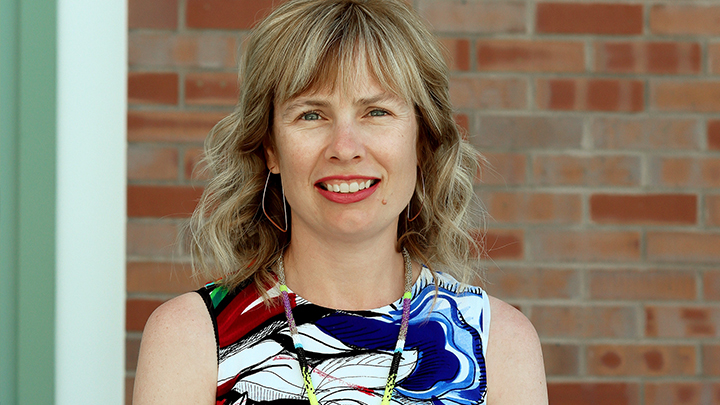
December 20, 2023

Dr. Dionne Walsh is the Physician Lead of the Program Committee for Schwartz Rounds. Photo by Jess Beck / Courtesy of Chinook Regional Hospital Foundation.
Story by Jennifer Vanderlaan
LETHBRIDGE — Sitting at her desk, Victoria Trautman, a registered nurse and site manager at Chinook Regional Hospital (CRH), prepares to speak over Zoom to more than 70 of her colleagues. She takes a deep breath and begins to tell a heartwarming story of the patient she’ll never forget.
Trautman is one of three inaugural panelists of Schwartz Rounds, a program adopted in the South Zone this year. Its goal is to foster empathy among healthcare workers, a reminder of the need for compassion and humanity. This is done simply by talking with one another. “As a nurse, our focus is always on our patients,” says Trautman. “To have a safe forum to share such a personal and spiritual story with my colleagues is important for me and my mental health.”
The Schwartz Center for Compassionate Healthcare — named after the late Ken Schwartz, who founded the Boston centre in 1995 — offers a variety of programs aimed at putting compassion at the heart of healthcare. Schwartz Rounds is one of these programs. It’s a structured forum where clinical and non-clinical staff come together in a safe space to express their feelings, with the guidance and support of a trained facilitator. Staff discuss the often stressful and difficult aspects of patient care, which ultimately strengthens the patient-caregiver relationship.
Dr. Dionne Walsh is familiar with the mental and emotional fatigue often associated with connecting, caring for, and empathizing with patients. Having worked as a palliative care physician for seven years, and on the COVID-19 unit at CRH during the pandemic, Dr. Walsh began to hear more and more from colleagues who were experiencing a similar fatigue.
“Staff started sharing with me their struggles caring for sick patients, some of whom died,” says Walsh. “It was during a conversation with my colleague about wanting to help others deal with the difficult aspects of healthcare that I first heard about Schwartz Rounds.”
Dr. Walsh then began to work on bringing the program to the South Zone.
“I like to move things along quickly and was eager to just do it,” adds Walsh. “But first we had to become a member of the Schwartz Center to receive the necessary training, material and resources to support running the program.”
Schwartz Rounds runs in more than 280 hospitals, hospices and other healthcare organizations in the U.S., Canada, Australia and New Zealand. “Taking our time to receive training and learning from a well-established program really set up our teams for success.”
In Lethbridge, there are 13 people who sit on the committee for Schwartz Rounds, including Dr. Walsh, who serves as the lead physician. Each Schwartz Round brings a theme and three panelists, often from diverse disciplines, each of whom have five minutes to share their story.
Prior to the round, the panelists are given the opportunity to practise what they’ll say with the facilitator. The facilitator’s job is to help panelists prepare for speaking in front of a large group of people about a rather personal part of their career story, and to help them feel comfortable and safe.
“I discuss psychological health and safety with the panelists because sometimes they’re sharing really vulnerable stories,” says Shobha George, an Occupational Therapist with Alberta Health Services (AHS) and facilitator for Schwartz Rounds.
Once the panelists have told their story, there’s time for the group to reflect and share feedback. Part of George’s role as facilitator is to foster a culture of compassion and understanding by encouraging discussion and vulnerability.
“It’s really therapeutic to listen to the discussion and to remember that the things that happen to others, happen to all of us, and also, that we are all OK,” says Walsh.
Trautman says she’s grateful she was one of the first panelists. Although she found it emotional to remember and speak of the patient she’ll never forget, she believes that showing her vulnerability to her colleagues is rewarding.
“I hope it showed my colleagues that it’s OK to be vulnerable, it’s OK to be emotional, and it’s OK to talk about the things in our career that are hard.”
Schwartz Rounds take place at CRH and at South Health Campus in Calgary virtually every three months. To find out more about the CRH rounds, email Dr. Walsh at dionne.walsh@ahs.ca.